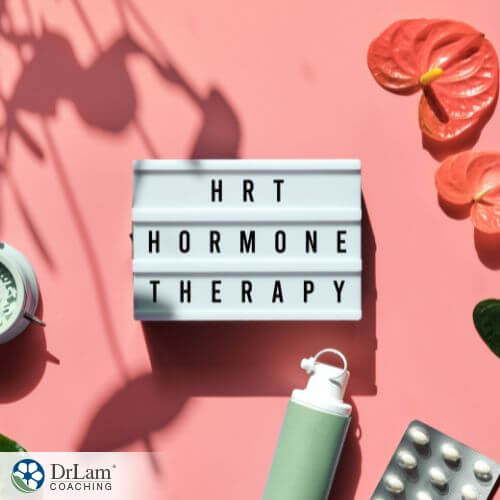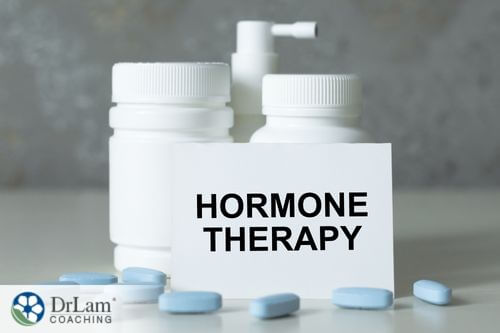 Hormone replacement therapy (HRT) has been the standard protocol in addressing the many symptoms women experience during menopause. Over the years, however, clinical trials have shown that HRT may pose serious health risks to some women. As a result, the North American Menopause Society (NAMS), as well as various health bodies across the globe, have set up new hormone therapy guidelines for medical professionals on the safe use of HRT.
Hormone replacement therapy (HRT) has been the standard protocol in addressing the many symptoms women experience during menopause. Over the years, however, clinical trials have shown that HRT may pose serious health risks to some women. As a result, the North American Menopause Society (NAMS), as well as various health bodies across the globe, have set up new hormone therapy guidelines for medical professionals on the safe use of HRT.
Where a general approach was previously used in addressing menopausal symptoms, the NAMS guidelines suggest an approach that is more personalized. Furthermore, those seeking help for menopause symptoms need to receive accurate information about the form of HRT suggested, the possible risks involved, and also take part in the decision-making process. Periodic reevaluations are also advised. This may help determine the patient’s potential risks and benefits of further following HRT. This would enable healthcare providers to better tailor dosages, the duration of HRT, and the administration methods for symptom management.
These new hormone therapy guidelines are needed due to recent studies on the various risk factors of HRT. We will look at these risk factors in a moment.
In addition to this, the newest hormone therapy guidelines offer the following recommendations for healthcare professionals:
A woman goes through three menopausal stages: perimenopause, menopause, and postmenopause.
Once reaching menopause, a woman can no longer have children because her body no longer releases eggs. Women typically reach menopause during their fifties, although some women may reach this stage later, and others earlier. Each woman’s menopause is unique.
HRT has long been seen as the answer to menopausal symptoms. While conventional medicine has long focused on the benefits of HRT, however, it has not seriously taken the risks involved into account. Nor has it looked at other possible protocols in dealing with menopausal symptoms. The latest hormone therapy guidelines try to cover all these issues.
HRT seeks to replace the estrogen a woman’s body stops making due to menopause. There are two types of hormone therapy.
 Systemic hormone therapy refers to an approach that sees the delivery of higher estrogen dosages throughout the body. This approach may ease all common menopausal symptoms. Delivery methods include tablets, vaginal rings, gels, creams, and sprays.
Systemic hormone therapy refers to an approach that sees the delivery of higher estrogen dosages throughout the body. This approach may ease all common menopausal symptoms. Delivery methods include tablets, vaginal rings, gels, creams, and sprays.
This approach minimizes the amount of estrogen absorbed by your body. Because of the low dosage, this approach is usually only used when addressing vaginal and urinary menopausal symptoms. It is administered via a vaginal ring, cream, or tablet.
Some HRT protocols make use of only estrogen to ease the symptoms of menopause.
Others combine estrogen and progesterone. They may also use progestin, a progesterone-like medication, instead of progesterone. The reason is that, when not balanced by progesterone, estrogen can stimulate uterine lining growth which may increase your endometrial cancer risk.
However, women who have undergone a hysterectomy, i.e., had their uterus removed, do not need to take progesterone.
Traditionally, hormone therapy is regarded as beneficial for the following issues:
The latest hormone therapy guidelines aim to significantly reduce the risks posed by conventional hormone therapy practices. Common hormone therapy risks include the following:
Several underlying factors may further influence your risk. These include:
According to the World Health Organization (WHO), these hormone therapy guidelines should be taken into consideration when addressing menopause.
Before receiving HRT, the healthcare provider should document all aspects of your personal health history. They should also do a physical examination, and check whether you have sound liver and kidney function. In addition to this, they should test for anemia and also take a look at your fasting blood sugar levels and serum lipid profile, amongst others. These general examinations determine your general state of health and suitability for HRT.
Elective examinations should also be considered. These include an endometrial biopsy, thyroid function test, and breast ultrasound. These should take place according to your personal risk factors and be repeated at least every two years.
HRT during perimenopause should focus on symptom severity and frequency. Low dosage oral contraceptives, estrogen, or estrogen-progesterone therapies may help improve symptoms.
 Making lifestyle changes and employing alternative therapies may also help ease symptoms. Alternative therapies include, amongst others, the use of bioidentical hormones. These phytoestrogens are derived from plant sources, such as black cohosh or soy. You can also find bioidentical products in the form of tablets, creams, gels, patches, injections, and implanted pellets.
Making lifestyle changes and employing alternative therapies may also help ease symptoms. Alternative therapies include, amongst others, the use of bioidentical hormones. These phytoestrogens are derived from plant sources, such as black cohosh or soy. You can also find bioidentical products in the form of tablets, creams, gels, patches, injections, and implanted pellets.
Many healthcare professionals regard bioidentical hormones, remarkably similar to those naturally produced in your body, as a safer estrogen solution. Conventional estrogen is made from horse urine and other manufactured chemicals.
Lifestyle changes to consider include getting enough exercise, following a healthier diet, doing what it takes to reduce your stress exposure, and employing various relaxation techniques like meditation.
Dietary changes may also help. This is because many plants are a rich source of bioidentical hormones. Healthy food choices in this regard include cabbage, broccoli, cauliflower, and Brussels sprouts.
Certain anxiety medications may also help, especially when dealing with mental health issues like mood swings that often present as symptoms of menopause.
Lastly, vitamins. Many women, both during the menopausal transition and after, have a shortage of certain vitamins that could exacerbate symptoms. Good vitamin options to consider include vitamins E, D, and B vitamins. All have beneficial effects on various aspects of menopause symptoms.
If using supplements, no matter the reason, please first consult your healthcare provider. They are best able to determine their suitability according to your health history and the dosage.
If hot flashes become a cause of concern, consider wearing lightweight cotton clothing, taking a cool shower, or sitting in front of a fan to cool down. A cool, damp, cotton towel may also help.
Conventional medicine tends not to see your body, with its different organs and circuits, as a single, functioning entity. Instead, it seeks to address certain perceived health issues as standing alone, often failing to realize that a symptom or health issue may result from a dysfunction in another organ or body circuit.
Your Hormone Circuit, for example, is one of the six circuits that form part of your body’s NeuroEndoMetabolic (NEM) stress response. Hormones play an essential role in communication between your different body organs and systems.
However, the aging process in women and menopause tend to cause a hormone imbalance due to the body’s inability to produce sufficient amounts of estrogen and progesterone. Once in postmenopause, the adrenal glands are left holding the torch as the only organ still able to produce this hormone.
The various symptoms associated with low estrogen levels could also indicate adrenal fatigue, especially if you experience a lot of stress. Supporting adrenal health while in menopause may thus help you deal with these additional symptoms. Symptoms associated with adrenal fatigue include those experienced during menopause as well as symptoms that include:
If going through menopause and new health issues arise that point toward adrenal fatigue, please talk to a healthcare provider aware of adrenal fatigue as soon as possible. This will enable you to set up protocols to ensure sufficient adrenal support.
 The new hormone therapy guidelines from NAMS recommend a more personalized approach with more documentation and frequent follow-up visits to make sure hormone therapy is better tailored to your needs and is kept at a minimal dose to minimize risk. However, there is still some risk associated with this therapy, and natural alternatives should be a consideration.
The new hormone therapy guidelines from NAMS recommend a more personalized approach with more documentation and frequent follow-up visits to make sure hormone therapy is better tailored to your needs and is kept at a minimal dose to minimize risk. However, there is still some risk associated with this therapy, and natural alternatives should be a consideration.
If you would like to know more about the latest hormone therapy guidelines or get more ideas on how to combat the symptoms of menopause, the team at Dr. Lam Coaching can help. We offer a free** no-obligation phone consultation at +1 (626) 571-1234 where we will privately discuss your concerns and offer viable solutions. You can also leave us a question through the Ask The Doctor system by clicking here.
The latest hormone therapy guidelines do not directly affect adrenal fatigue. They do, however, take into account the risks posed by conventional hormone therapy protocols that could increase your adrenal fatigue risk. Your healthcare practitioner can advise you on supporting adrenal health during menopause.
